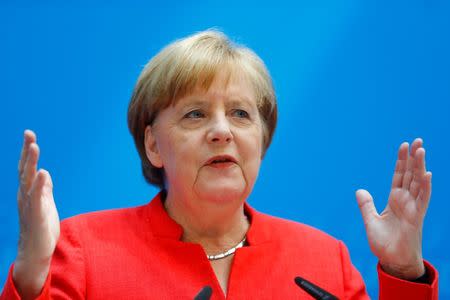Bavarian CSU welcomes Merkel's migration deals ahead of Sunday crisis meeting

By Thomas Escritt
BERLIN (Reuters) - Bavaria's premier welcomed deals on migration brought back from Brussels by Angela Merkel, giving the clearest signal yet that his party was prepared to back down in a standoff with the German chancellor that has risked bringing down her government.
In a document sent to the leaders of her coalition partners and seen by Reuters, Merkel listed 14 EU countries, including some of those most outspoken in their opposition to her open-door refugee policy, which had indicated they were prepared to take back migrants.
A separate deal was struck with Spain and Greece.
"It goes in absolutely the right direction," Bavarian premier Markus Soeder said on Saturday, taking credit for keeping up the pressure for a deal.
The leadership of Bavaria's CSU conservatives, working to claw back voters lost to a far-right party before regional elections in October, is meeting on Sunday to decide whether to accept the concessions Merkel secured.
A refusal to do so could rupture the party's 70-year alliance with Merkel's Christian Democrats (CDU), depriving her of a majority in Europe's economic powerhouse.
The dispute over how to handle migration has plunged Merkel's three-month-old "grand coalition" into crisis and weakened the conservative leader, who has served for nearly 13 years, forcing German officials to scramble to try to reach deals with individual EU members.
The agreements, hammered out during through-the-night talks at an EU summit in Brussels, would speed up the process of repatriating refugees whose presence in the EU was first recorded in those 14 countries.
Under the separate deal with Greece and Spain, Berlin agreed to take refugees in the two countries who wanted to be reunited with family members already in Germany. In return, the two countries will take from Germany some people regarded as migrants, not refugees.
The document also proposed establishing reception centres in Germany for refugees arriving at the border with Austria who had earlier been recorded entering another European country, allowing them to be subjected to an accelerated asylum assessment process.
The country by country agreements or statements of intent are separate from the broader summit conclusion to share out refugees arriving in the bloc on a voluntary basis and create "controlled centres" inside the EU to process asylum requests.
But substantial confusion remained over what the 14 countries had agreed to, with Hungary's government spokesman Zoltan Kovacs denying that any agreement had been made with Budapest.
"No such deal has been reached," Kovacs said when asked about the document, which says the 14 countries have "consented on a political level" to making such an agreement.
Under the EU's Dublin convention, largely overlooked since Merkel's 2015 decision to open Germany's borders, asylum seekers must lodge their requests in the first EU country they set foot in.
"It is impossible for a migrant to enter Hungary without entering another EU member earlier," Kovacs added, saying this meant any agreement would be impossible.
Hungary has an external border with Serbia, but most asylum seekers who reach the country first entered the EU in Greece.
Handelsblatt newspaper also reported that a Czech government spokeswoman had also denied entering such an agreement.
However, speaking in Paris earlier on Saturday, Czech Prime Minister Andrej Babis welcomed agreements reached at the summit, saying he was pleased that a demand for migrant quotas had been dropped.
The other countries named in the document circulated in Berlin are Belgium, Denmark, Estonia, Finland, France, Lithuania, Latvia, Luxembourg, the Netherlands, Poland, Portugal and Sweden.
(Reporting by Andreas Rinke in Berlin and Sandor Peto in Budapest; Writing by Thomas Escritt, Editing by Ros Russell and Alison Williams)

